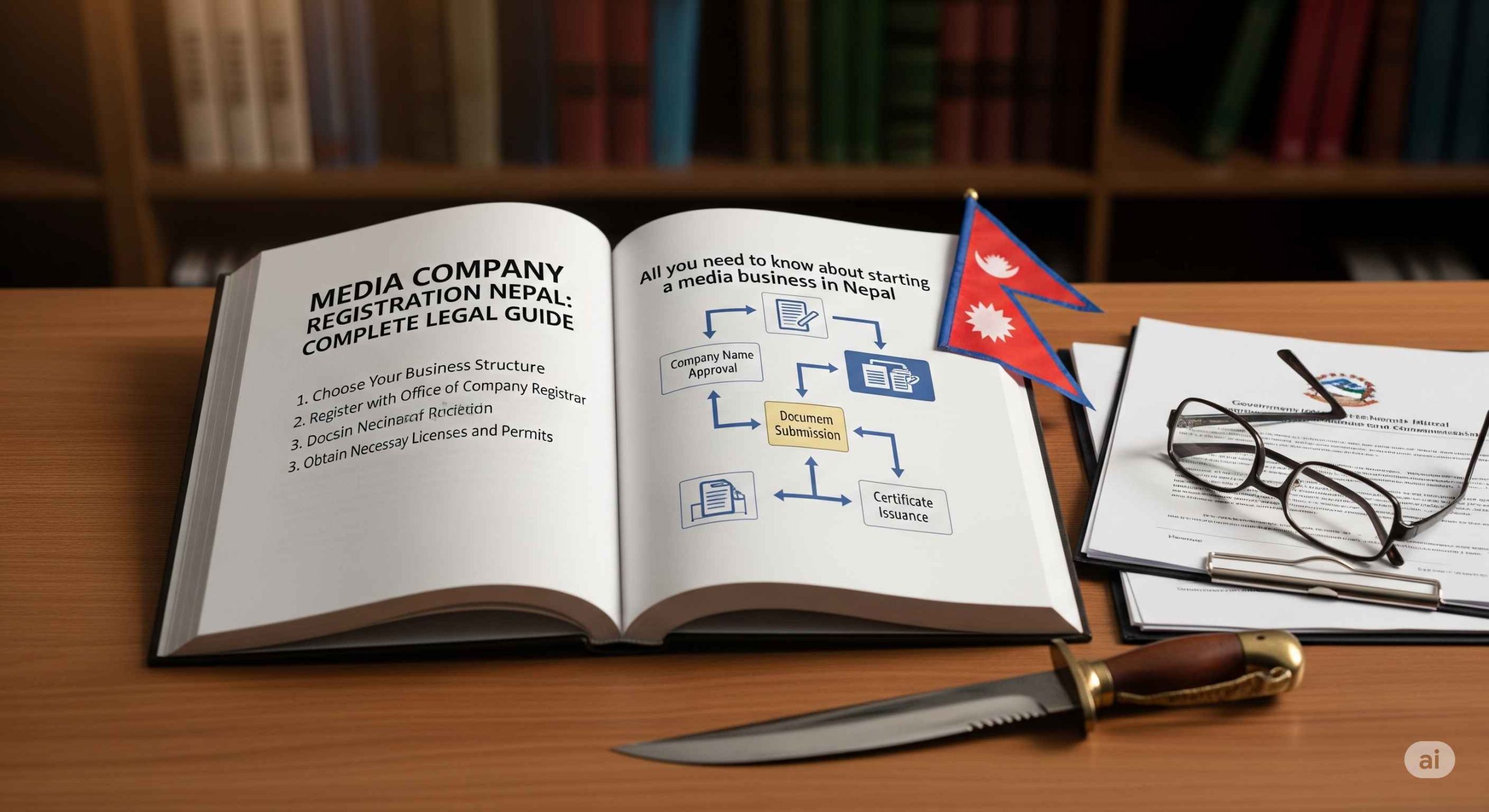Table of Contents
Media Company Registration Nepal: Your Complete Legal Roadmap for 2025
Establishing a media company registration Nepal requires navigating complex legal frameworks that govern press freedom, journalism standards, and business operations. This comprehensive guide provides entrepreneurs with everything needed to successfully register and operate a media company in Nepal’s evolving media landscape.
The media company registration Nepal process involves multiple regulatory bodies, including the Office of Company Registrar (OCR), Press Council Nepal (PCN), and Department of Information and Broadcasting, each with specific requirements and compliance obligations.
What is Media Company Registration in Nepal?
Media company registration Nepal refers to the comprehensive legal process of establishing a media entity under Nepal’s Companies Act 2063 (2006) and relevant media laws. This registration enables your media company to operate legally, publish content, and engage in journalism activities while maintaining press freedom within legal boundaries.
The media company registration process transforms your media venture into a legally recognized entity capable of obtaining press credentials, accessing government information, and building credibility with audiences and advertisers.
Education Consultancy Registration in Nepal | Branch Office registration in Nepal
Why Media Company Registration Nepal is Essential for Media Entrepreneurs
Understanding the importance of media company registration Nepal is crucial for anyone entering Nepal’s media industry:
Legal Protection: Registered media companies enjoy constitutional press freedom protections while operating within established legal frameworks that protect journalists and media entities.
Press Credentials: Only registered media companies can obtain official press passes from Press Council Nepal, enabling access to government events, press conferences, and official information.
Advertising Revenue: Legitimate advertisers and government agencies only work with registered media companies, ensuring sustainable revenue streams for your media venture.
Professional Credibility: Registered media companies command respect from sources, government officials, and the public, essential for effective journalism and content creation.
Legal Framework Governing Media Company Registration Nepal
Your media company operates under a comprehensive legal framework designed to balance press freedom with social responsibility:
Primary Media Legislation
Constitution of Nepal 2072: Guarantees freedom of press and expression while establishing parameters for responsible journalism that media companies must follow.
Press and Publication Act 2048: The fundamental law governing media company registration Nepal, defining operational standards, content guidelines, and regulatory compliance requirements.
Broadcasting Act 2048: Regulates electronic media companies including television and radio stations, establishing licensing procedures and content standards.
Information Technology Act 2072: Governs online media companies, news portals, and digital journalism platforms with specific registration and operational requirements.
Regulatory Authorities
Press Council Nepal (PCN): The statutory body set up by Government of Nepal to promote the standards of a free press in a democratic society and to advise the government on matters relating to the development of healthy and credible journalism.
Department of Information and Broadcasting: Handles the registration process for media entities, requiring submission of applications along with necessary documentation and fees.
Office of Company Registrar (OCR): Processes corporate registration for media companies under standard company incorporation procedures.
Types of Media Companies in Nepal
Understanding different media company categories helps determine specific registration requirements:
Print Media Companies
Newspapers: Daily, weekly, or monthly publications requiring company registration and press council accreditation Magazines: Specialized publications focusing on specific topics or demographics Publishing Houses: Companies producing books, journals, and other printed materials
Electronic Media Companies
Television Stations: Require broadcasting licenses in addition to company registration Radio Stations: Need frequency allocation and broadcasting permits Cable Operators: Require specific licenses for content distribution
Digital Media Companies
News Portals: Online news platforms requiring minimum paid-up capital of NPR 500,000 for national-level operations and NPR 300,000 for provincial-level portals Digital Magazines: Online publications and content platforms Multimedia Companies: Integrated digital content creators
Required Documents for Media Company Registration Nepal
Success in media company registration Nepal demands meticulous document preparation. Here’s your comprehensive checklist:
Core Registration Documents
| Document Type | Quantity Required | Specific Media Requirements |
|---|---|---|
| Memorandum of Association (MOA) | 2 copies | Must specify media/journalism activities clearly |
| Articles of Association (AOA) | 2 copies | Include editorial policies and content guidelines |
| Company Name Reservation Certificate | 1 original | Valid for 35 days, should reflect media nature |
| Citizenship Certificates | 2 copies each | All promoters, directors, and key editorial staff |
| Passport-sized Photographs | 4 copies each | Recent photographs of directors and editors |
Financial Documentation for Media Companies
Bank Statement: Proof of minimum capital requirement based on media type Capital Adequacy Certificate: Bank guarantee of NPR 100,000 deposited with the registration authority Auditor Consent Letter: From qualified chartered accountant experienced with media companies Share Subscription Agreement: Detailed ownership structure for media company
Editorial and Content Documentation
Editorial Policy Document: Comprehensive editorial guidelines and content standards Code of Conduct: Journalistic ethics and professional standards document Staff Qualifications: Credentials of key editorial and journalism personnel Content Strategy: Detailed description of planned media content and target audience
Technical Infrastructure Documents
Office Rental Agreement: Minimum 11-month validity with adequate space for media operations Equipment List: Detailed inventory of journalism equipment, cameras, recording devices Technology Infrastructure: Computer systems, internet connectivity, publishing software Security Arrangements: Physical and digital security measures for media operations
Step-by-Step Media Company Registration Nepal Procedure
Follow this comprehensive procedure for successful media company registration Nepal:
Phase 1: Pre-Registration Planning (5-7 days)
Step 1: Determine your media company type and target market Step 2: Secure minimum capital based on media category requirements Step 3: Identify suitable office location meeting media operation needs Step 4: Recruit key editorial staff and journalism professionals Step 5: Develop comprehensive editorial policies and content guidelines
Phase 2: Company Name Reservation (2-3 days)
Step 1: Access OCR e-Services portal (ocr.gov.np) for name reservation Step 2: Submit 1-3 proposed media company names reflecting media nature Step 3: Pay name reservation fee (NPR 100 per name) Step 4: Receive approval notification within 2-3 working days
Media Naming Guidelines: Choose names ending with “Media,” “Press,” “Broadcasting,” or “Publications” for clarity and professional recognition.
Phase 3: Document Preparation and Submission (7-10 days)
Step 1: Complete comprehensive media company registration application Step 2: Prepare all required documents with media-specific requirements Step 3: Upload documents in specified formats on OCR portal Step 4: Pay registration fees based on authorized capital amount Step 5: Submit physical documents to respective OCR office
Phase 4: Press Council Registration (5-7 days)
Step 1: Apply for Press Pass from the Press Council Nepal (PCN), the regulatory body for media in Nepal
Step 2: Submit editorial policy and code of conduct documents
Step 3: Provide credentials of key editorial staff
Step 4: Pay applicable PCN registration and accreditation fees Step 5: Await PCN review and approval
Phase 5: Specialized Media Licenses (10-15 days)
Step 1: Apply to Department of Information and Broadcasting for media-specific licenses
Step 2: Submit technical infrastructure and content strategy documents
Step 3: Undergo site inspection for physical infrastructure verification
Step 4: Pay applicable licensing fees based on media type
Step 5: Receive specialized media operation permits
Phase 6: Post-Registration Compliance (5-10 days)
Step 1: Register for PAN/VAT with Inland Revenue Department Step 2: Obtain municipal business license for media operations Step 3: Open corporate bank account with media company documentation Step 4: Register with social security fund for editorial staff Step 5: Implement required record-keeping and reporting systems
Legal Compliance Requirements for Media Companies in Nepal
Maintaining legal compliance is critical for media company operations and press freedom protection:
Editorial and Content Compliance
Journalistic Standards: Adhere to Press Council Nepal’s code of conduct and ethical journalism standards Content Guidelines: Ensure all published content complies with Press and Publication Act requirements Source Protection: Implement proper procedures for protecting journalistic sources and confidential information Fact-Checking: Establish robust verification processes for news and information accuracy
Regulatory Reporting Requirements
Annual Returns: Submit detailed annual reports to OCR within specified timeframes
Content Reports: File quarterly content reports with Press Council Nepal
Circulation Data: Maintain accurate circulation and viewership records for audit purposes
Financial Reporting: Comply with enhanced transparency requirements for media companies
Press Freedom Protections and Limitations
Constitutional Rights: Exercise press freedom within constitutional boundaries while respecting individual rights
Defamation Laws: Understand and comply with defamation and privacy laws affecting media operations National Security: Navigate content restrictions related to national security and public order
Court Proceedings: Follow specific guidelines for reporting on legal proceedings and investigations
Specialized Requirements for Online Media Companies
Digital media companies face additional registration and compliance requirements:
Online Media Registration Process
Department Registration: Submit applications to the Department of Information and Broadcasting with necessary documentation and fees, meeting specific criteria related to citizenship, financial capacity, and technical infrastructure
Technical Infrastructure: Demonstrate robust digital infrastructure capable of reliable content delivery Content Management: Implement proper content management systems with archiving and retrieval capabilities Cybersecurity Measures: Establish comprehensive digital security protocols protecting content and user data
Financial Requirements for Online Media
Minimum Capital: NPR 500,000 for national-level news portals and NPR 300,000 for provincial-level news portals Bank Guarantee: NPR 100,000 deposited with the registration authority as financial security Operational Funding: Adequate working capital for sustained digital operations and content production
Cost Analysis: Media Company Registration Nepal Budget
Planning your media company registration Nepal requires understanding comprehensive costs:
Government Registration Fees
| Registration Type | Cost Range (NPR) | Description |
|---|---|---|
| Company Registration | 1,000-50,000 | Based on authorized capital |
| Press Council Registration | 5,000-25,000 | Varies by media type |
| Media License Fees | 10,000-100,000 | Based on reach and scope |
| Annual Compliance Fees | 2,000-15,000 | Ongoing regulatory fees |
Professional Service Costs
Legal Consultation: NPR 25,000-75,000 for media law expertise Document Preparation: NPR 15,000-40,000 for media-specific documentation Editorial Consulting: NPR 20,000-60,000 for policy development Compliance Setup: NPR 10,000-30,000 for ongoing systems
Operational Setup Investment
Office Setup: NPR 100,000-500,000 (location and size dependent) Equipment Investment: NPR 200,000-2,000,000 (cameras, computers, software) Staff Recruitment: NPR 50,000-200,000 (journalists, editors, support staff) Initial Marketing: NPR 25,000-150,000 (brand building and audience development)
Common Challenges in Media Company Registration Nepal
Navigate these common challenges for smoother media company registration Nepal:
Editorial Policy Development
Content Guidelines: Developing comprehensive editorial policies balancing journalistic freedom with legal compliance Ethical Standards: Establishing clear ethical guidelines for journalists and content creators Source Protection: Creating robust procedures for protecting confidential sources and information
Financial Compliance Challenges
Capital Requirements: Meeting minimum capital requirements while maintaining operational liquidity Revenue Planning: Developing sustainable revenue models in Nepal’s challenging media market Financial Transparency: Implementing enhanced financial reporting required for media companies
Technical Infrastructure Requirements
Equipment Standards: Meeting professional journalism equipment standards within budget constraints Digital Infrastructure: Building reliable digital platforms for online media operations Security Systems: Implementing comprehensive security for both physical and digital assets
Media Company Licensing and Accreditation
Beyond basic registration, media companies require specialized licenses and accreditations:
Press Council Nepal Accreditation
Individual Accreditation: Press passes for journalists and editorial staff Institutional Recognition: Official recognition as legitimate media entity Code of Conduct Compliance: Ongoing adherence to journalistic standards Continuing Education: Participation in PCN training and development programs
Broadcasting Licenses (For Electronic Media)
Frequency Allocation: For radio and television broadcasting companies Content Broadcasting Permits: Authorization for specific content types Technical Standards Compliance: Meeting broadcasting quality and technical requirements Regular Renewal Procedures: Maintaining valid broadcasting authorizations
Digital Media Certifications
Online Platform Registration: Formal registration for news portals and digital media Content Delivery Standards: Meeting online content delivery and accessibility standards Data Protection Compliance: Adhering to digital privacy and data protection requirements Social Media Integration: Proper handling of social media content and distribution
International Media Company Considerations
For media companies with international scope or foreign investment:
Foreign Investment in Media
FITTA Registration: Required for foreign equity participation in media companies Content Restrictions: Understanding limitations on foreign influence in local media content Ownership Limitations: Compliance with foreign ownership restrictions in media sector Cultural Sensitivity: Navigating cultural and political sensitivities in international content
Cross-Border Media Operations
International Reporting: Procedures for international news gathering and reporting Correspondent Accreditation: Obtaining international press credentials for foreign reporting Content Syndication: Legal frameworks for sharing content with international media partners Revenue Repatriation: Understanding foreign exchange regulations for international revenue
Post-Registration Media Company Operations
After successful media company registration Nepal, focus on these operational priorities:
Editorial Team Development
Journalist Recruitment: Hiring qualified journalists and editorial staff Training Programs: Implementing ongoing professional development for media personnel Performance Standards: Establishing clear performance metrics and evaluation procedures Career Development: Creating advancement opportunities for media professionals
Content Development and Distribution
Content Strategy: Implementing comprehensive content planning and production workflows Distribution Channels: Establishing effective content distribution across multiple platforms Audience Engagement: Developing strategies for building and maintaining audience relationships Revenue Generation: Implementing sustainable monetization strategies for media content
Technology Integration
Content Management Systems: Implementing professional-grade content management and publishing platforms Digital Analytics: Establishing comprehensive audience analytics and performance tracking Social Media Integration: Professional social media management and content distribution Archive Management: Proper archiving and retrieval systems for published content
Media Company Growth and Expansion Strategies
Plan your media company’s growth trajectory from the registration stage:
Service Diversification
Multi-Platform Publishing: Expanding across print, digital, and broadcast media Specialized Content: Developing niche content areas and specialized journalism Corporate Services: Offering content creation and communication services to businesses Event Management: Media events, conferences, and industry gatherings
Market Expansion Opportunities
Geographic Expansion: Extending operations to additional provinces and districts Language Diversification: Content production in multiple languages for broader reach International Markets: Targeting Nepali diaspora and regional audiences Partnership Development: Collaborating with international media organizations
Frequently Asked Questions About Media Company Registration Nepal
What is the minimum capital required for media company registration Nepal?
The minimum capital requirement varies by media type. National-level news portals require NPR 500,000, while provincial-level portals need NPR 300,000. Traditional print media companies typically require NPR 100,000-1,000,000 depending on scope and scale.
How long does media company registration Nepal take?
Complete media company registration Nepal typically takes 25-40 working days, including company registration, Press Council accreditation, specialized licenses, and post-registration compliance activities.
Can foreign nationals own media companies in Nepal?
Foreign ownership in media companies is restricted under Nepal’s media laws. Foreign nationals can participate through FITTA registration with specific limitations on ownership percentage and editorial control.
What licenses are required beyond company registration for media companies?
Media companies require Press Council Nepal registration, Department of Information and Broadcasting licenses, municipal permits, and specialized broadcasting licenses for electronic media operations.
Where do I submit media company registration applications?
Company registration applications are submitted through OCR e-Services portal, while media-specific licenses are processed by Press Council Nepal and Department of Information and Broadcasting
What are the ongoing compliance requirements for registered media companies?
Company registration applications are submitted through OCR e-Services portal, while media-specific licenses are processed by Press Council Nepal and Department of Information and Broadcasting.
Can I operate a news portal without media company registration?
Operating news portals or media services without proper registration violates media laws and can result in legal action, content blocking, and financial penalties.
What editorial standards must media companies maintain?
Media companies must adhere to Press Council Nepal’s code of conduct, maintain journalistic ethics, ensure content accuracy, respect privacy rights, and follow responsible journalism practices.
Conclusion: Your Path to Successful Media Company Registration Nepal
Successfully completing media company registration Nepal marks the beginning of your contribution to Nepal’s vibrant media landscape. The country’s commitment to press freedom, combined with growing media consumption, creates excellent opportunities for new media companies to serve public interest while building sustainable businesses.
Media company registration Nepal is more than a legal requirement—it’s your foundation for credible journalism, public service, and professional media operations. Proper registration protects your press freedom rights, establishes credibility with sources and audiences, and opens access to government information and professional networks.
The key to smooth media company registration Nepal lies in understanding the complex regulatory environment, preparing comprehensive documentation, and maintaining ongoing compliance with media laws and journalistic standards. While the process requires significant investment in time and resources, registered media companies enjoy constitutional protection and professional recognition that informal media operations cannot access.
Take Action Today: Nepal’s media landscape needs responsible, professional media companies committed to serving public interest. Start your media company registration Nepal journey by preparing your editorial policies and securing the minimum capital requirements. The public deserves access to quality journalism and information that only properly registered media companies can provide reliably.
For expert assistance with your media company registration Nepal process, consult with legal professionals specializing in media law who understand the unique challenges and opportunities in Nepal’s evolving media sector.




